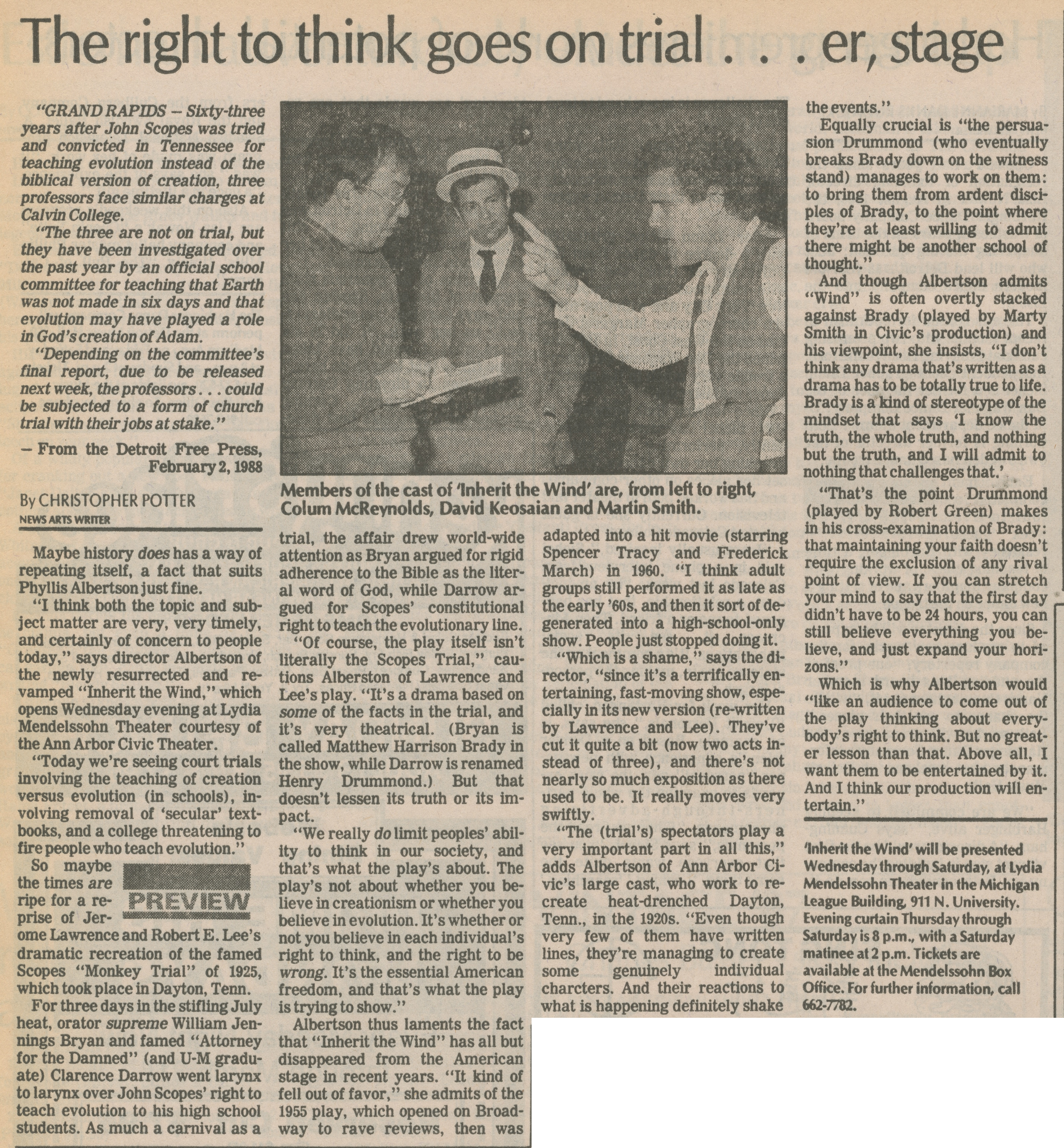The Right To Think Goes On Trial . . . Er, Stage

The right to think goes on trial. . . er, stage
Members of the cast of 'Inherit the Wind' are, from left to right, Colum McReynolds, David Keosaian and Martin Smith.
"GRAND RAPIDS - Sixty-three years after John Scopes was tried and convicted in Tennessee for teaching evolution instead of the biblical version of creation, three professors face similar charges at Calvin College.
"The three are not on trial, but they have been investigated over the past year by an official school committee for teaching that Earth was not made in six days and that evolution may have played a role in God's creation of Adam.
"Depending on the committee’s final report, due to be released next week, the professors... could be subjected to a form of church trial with their jobs at stake. ’’
- From the Detroit Free Press, February 2,1988
By CHRISTOPHER POTTER
NEWS ARTS WRITER
Maybe history does has a way of repeating itself, a fact that suits Phyllis Albertson just fine.
“I think both the topic and subject matter are very, very timely, and certainly of concern to people today,” says director Albertson of the newly resurrected and revamped “Inherit the Wind,” which opens Wednesday evening at Lydia Mendelssohn Theater courtesy of the Ann Arbor Civic Theater.
“Today we’re seeing court trials involving the teaching of creation versus evolution (in schools), involving removal of ‘secular’ textbooks, and a college threatening to fire people who teach evolution.”
So maybe the times are ripe for a reprise of Jerome Lawrence and Robert E. Lee’s dramatic recreation of the famed Scopes “Monkey Trial” of 1925, which took place in Dayton, Tenn.
For three days in the stifling July heat, orator supreme William Jennings Bryan and famed “Attorney for the Damned” (and U-M graduate) Clarence Darrow went larynx to larynx over John Scopes’ right to teach evolution to his high school students. As much a carnival as a trial, the affair drew world-wide attention as Bryan argued for rigid adherence to the Bible as the literal word of God, while Darrow argued for Scopes’ constitutional right to teach the evolutionary line.
“Of course, the play itself isn’t literally the Scopes Trial,” cautions Alberston of Lawrence and Lee’s play. “It’s a drama based on some of the facts in the trial, and it’s very theatrical. (Bryan is called Matthew Harrison Brady in the show, while Darrow is renamed Henry Drummond.) But that doesn’t lessen its truth or its impact.
“We really do limit peoples’ ability to think in our society, and that’s what the play’s about. The play’s not about whether you believe in creationism or whether you believe in evolution. It’s whether or not you believe in each individual’s right to think, and the right to be wrong. It’s the essential American freedom, and that’s what the play is trying to show.”
Albertson thus laments the fact that “Inherit the Wind" has all but disappeared from the American stage in recent years. “It kind of fell out of favor,” she admits of the 1955 play, which opened on Broadway to rave reviews, then was adapted into a hit movie (starring Spencer Tracy and Frederick March) in 1960. “I think adult groups still performed it as late as the early ’60s, and then it sort of degenerated into a high-school-only show. People just stopped doing it.
“Which is a shame,” says the director, “since it’s a terrifically entertaining, fast-moving show, especially in its new version (re-written by Lawrence and Lee). They’ve cut it quite a bit (now two acts instead of three), and there’s not nearly so much exposition as there used to be. It really moves very swiftly.
“The (trial’s) spectators play a very important part in all this,” adds Albertson of Ann Arbor Civic’s large cast, who work to recreate heat-drenched Dayton, Tenn., in the 1920s. “Even though very few of them have written lines, they’re managing to create some genuinely individual charcters. And their reactions to what is happening definitely shake the events.”
Equally crucial is “the persuasion Drummond (who eventually breaks Brady down on the witness stand) manages to work on them: to bring them from ardent disciples of Brady, to the point where they’re at least willing to admit there might be another school of thought.”
And though Albertson admits “Wind” is often overtly stacked against Brady (played by Marty Smith in Civic’s production) and his viewpoint, she insists, “I don’t think any drama that’s written as a drama has to be totally true to life. Brady is a kind of stereotype of the mindset that says ‘I know the truth, the whole truth, and nothing but the truth, and I will admit to nothing that challenges that.’
“That’s the point Drummond (played by Robert Green) makes in his cross-examination of Brady: that maintaining your faith doesn’t require the exclusion of any rival point of view. If you can stretch your mind to say that the first day didn’t have to be 24 hours, you can still believe everything you believe, and just expand your horizons.”
Which is why Albertson would “like an audience to come out of the play thinking about everybody’s right to think. But no greater lesson than that. Above all, I want them to be entertained by it. And I think our production will entertain.”
'Inherit the Wind' will be presented Wednesday through Saturday, at Lydia Mendelssohn Theater in the Michigan League Building, 911 N. University. Evening curtain Thursday through Saturday is 8 p.m., with a Saturday matinee at 2 p.m. Tickets are available at the Mendelssohn Box Office. For further information, call 662-7782.